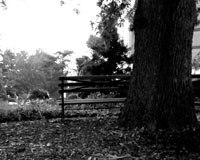
Nuclear Family
We Wake Up to Tunnel Collapse
Luck in the Guacamole
Dodge
I was born at the same time
my father worked at Yale
on a prototype of the CT scan machine.
While I pulled grass and strawberries,
honeysuckle and daffodils,
he sowed nuclear waste underground,
next door at Oak Ridge National Labs.
He taught me how to use the Geiger counter
and play chess with robot arms,
talk to computers and warned me
the snow wasn’t safe.
The lines were tapped.
In college I studied ecotoxicology,
environmental law with engineers and grad students.
I edited papers on Fernald, contaminated
groundwater, its effects on children,
Ohio cancer clusters.
Inside I bloomed. Thyroid nodules,
brain lesions, liver lesions. Perhaps my skin
and bones still harbor Cesium-137,
traces of my old farm life, my father’s work
trying to stay alive within me.
There’s an ink, Prussian Blue,
that can bind Cesium in the body.
In Fukushima and Chernobyl
they grow flowers to leach the soil,
but it does no good. The yellow sunflowers
and field mustard are too toxic to touch.
Like me, they live out their lives as decoration,
some kind of wild field mutated but covert.
At Hanford, and the threat of nuclear war.
Men continue to run their machines
while the dust from poisons created fifty years
ago sifts into the air. You cannot stop
what you’ve started, you can merely try
to contain and that won’t be 100 percent
successful. So, Chernobyl, Fukushima.
Oak Ridge and Hanford are aging,
their signs dusty and faded, their skeletons
on the verge of crumbling. “No one thought
that far ahead,” says one engineer. Of course not.
North Korea tests another bomb.
At the Bikini Islands, people are still discovering
radioactive boats, castoffs and artifacts, sinking
under the sea. What is the impact of Chernobyl?
Of Fukushima? Too soon to tell.
Some six-legged calves, others tell of wild boar run amok,
grains growing unharvested. Chernobyl has become a kind
of tourist site, a spooky playground
where no one plays, anymore.
You think this is impersonal?
In my old playground at Oak Ridge,
children develop thyroid cancer,
leukemia. The hospitals do not release numbers.
I myself bear tumors, nodules, lesions.
How much Cesium and how fast can it be absorbed
through skin, through our food,
in our systems of organs? You haven’t even learned this
yet. But still, your children play above tunnels
still uncollapsed. That nuclear site down the road is aging,
sagging, concrete cracks ready to unleash
what we’ve been shoving underground for years.
They will tell you it’s safe, so safe, the grass
still green and lush, the rabbits and deer trusting your complicated silence.
The morning I waited for them to tell me
if I would live or die (and by die, I mean, die next month,
not die like all mortals will, eventually,
but immediately and by a known cause)
I dreamed of a hummingbird landing on one finger
at a picnic table, and another hummingbird
landing in the guacamole.
Hummingbirds, little signs of luck, charm, eternal life:
what are they doing in the avocado?
Hilarious misstep, green on green.
The cyclops’ curse of knowing
when and how they would die
is a particularly sad one. Now I know
I am lucky enough not to be dying
of a known cause in one month, I think
how lucky we are, how lucky to be offered
the chance to not know
the time and cause of our coming ends,
the car crash or surgeon error that will nick our artery,
the tornado that will lift us out of bed.
We lend so much faith now to doctors
that we used to lend to priests, to monsters,
to prophetesses waiting under a statue for your offering
to tell you: grace or no grace.
Here, this hummingbird has lined up
its little feet on my hand at the picnic table to tell us:
there is no greater joy that to move forward,
to hover in expectation
of nothing but more life,
to lend us the mercy of surprise.
You think you can dodge this
like the silver bullet from a gun
of a man in a black suit?
Like a clumsy sword?
You think that disguise
is going to fool anyone?
No, this is a trick of light,
the burn and dodge of photographs;
pay attention to the shadows, what they obscure.
They might be a sign of stroke, of cancer, of nerve damage.
Like dodgeball – the point is not
to get hit in the face, but you won’t see it coming.
Life and death are always a surprise
to people, crying when we appear
and crying as we exit,
at first in wonder, then in disbelief.
There is no dodging the inevitable end –
it’s either this next dance,
or the one after that.
Jeannine Hall Gailey served as the second Poet Laureate of Redmond, Washington. She is the author of five books of poetry: Becoming the Villainess, She Returns to the Floating World, Unexplained Fevers, The Robot Scientist’s Daughter, and winner of the Moon City Press book prize, Field Guide to the End of the World. Her poems have appeared in The American Poetry Review, The Iowa Review and Prairie Schooner. Her web site is www.webbish6.com.

